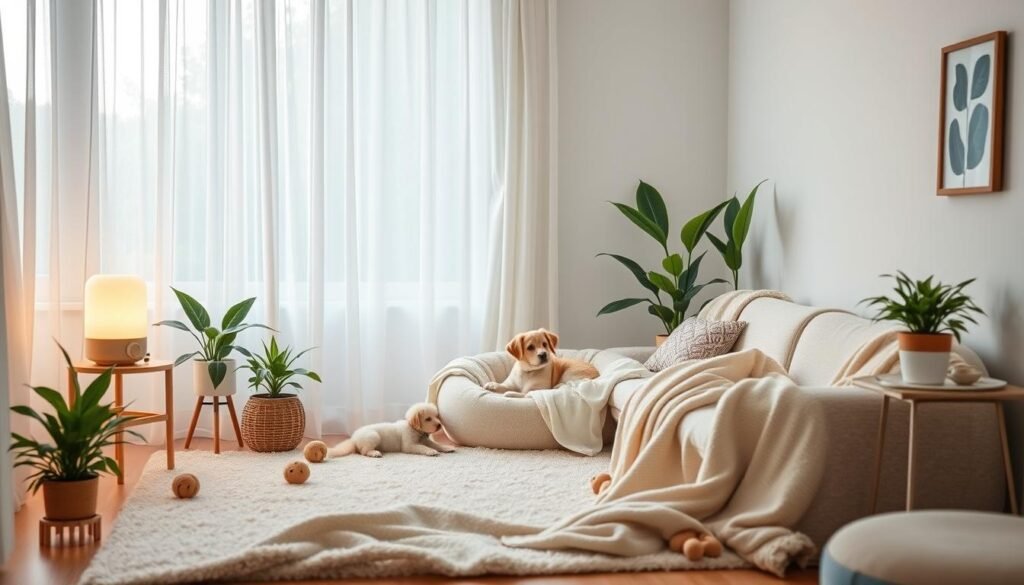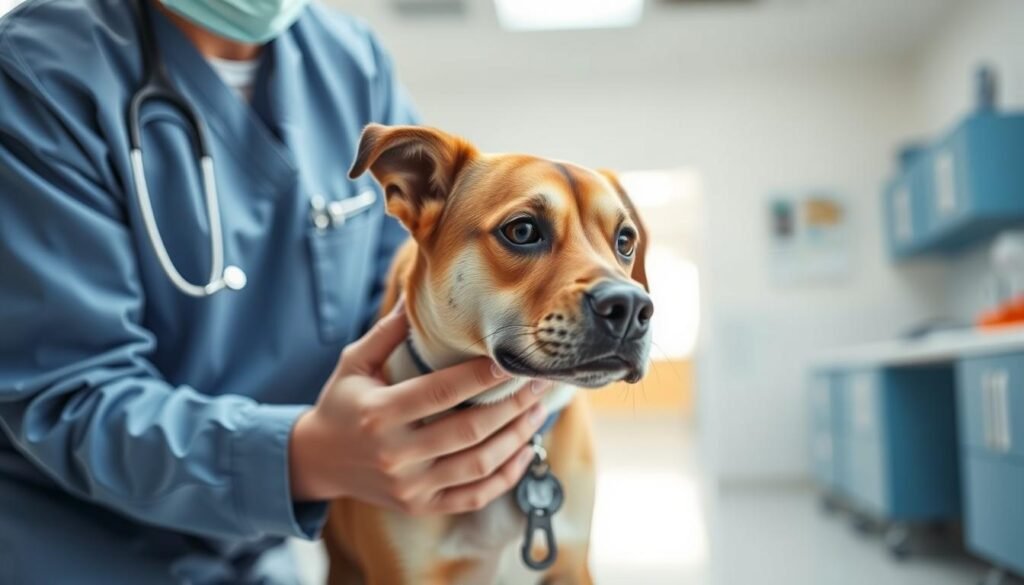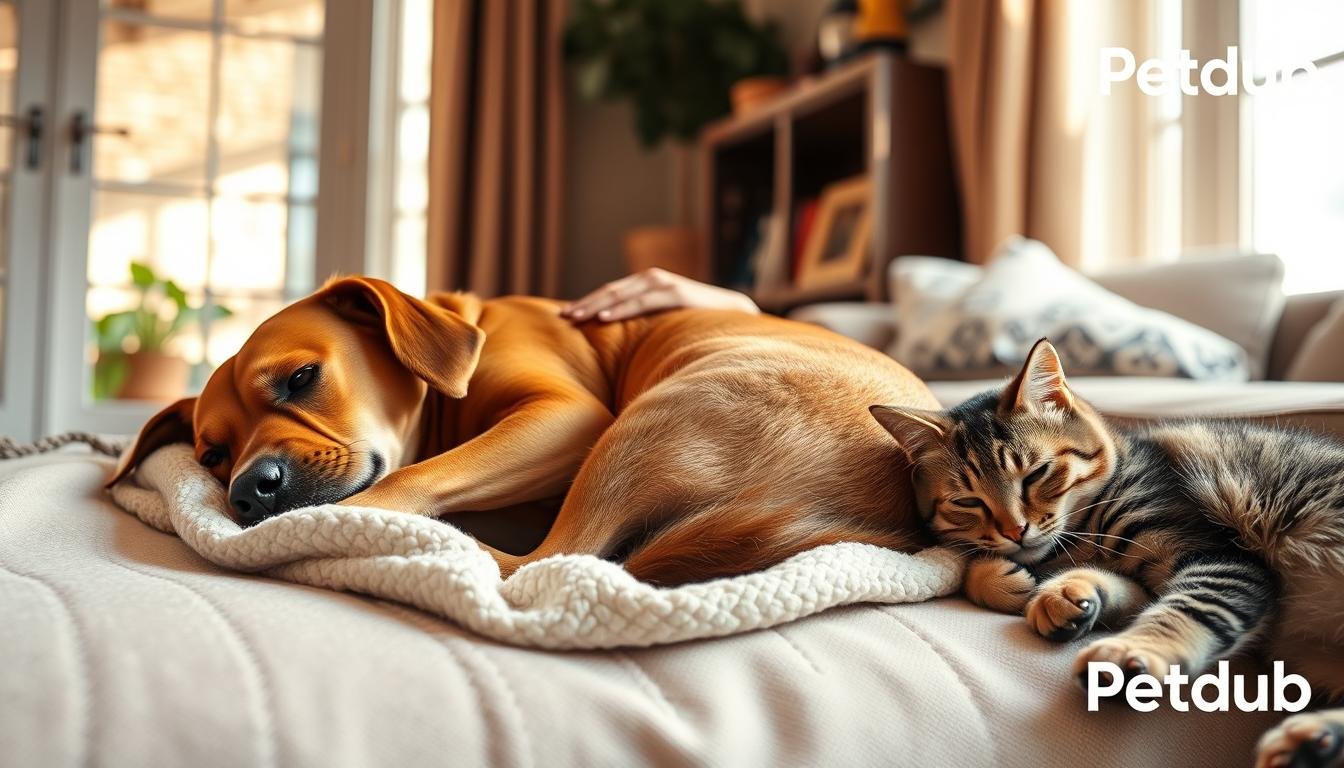Seeing your pet anxious can be heartbreaking. Whether it’s a pup scared of thunder or a cat hiding from fireworks, it’s tough. But, there are ways to calm anxious pets and make them feel safe again.
This guide will show you how to soothe your pets and make their home stress-free. We’ll look at natural remedies, calming supplements, and training methods. We’ll also explore new products to help your pets feel better. So, let’s find ways to make your pets happy and relaxed at home.
Key Takeaways
- Understand the common signs and triggers of pet anxiety to better address their needs
- Discover natural remedies and calming supplements that can help relieve your pet’s stress
- Learn about innovative products like thundershirts and pheromone diffusers designed to soothe anxious pets
- Explore the benefits of playtime, exercise, and soothing music to promote a calming environment
- Implement effective training techniques like desensitization and counterconditioning to help your pet overcome their fears
Understanding Pet Anxiety
As pet owners, it’s key to know what causes pet anxiety. This helps our pets feel calm and happy. Pet anxiety shows up in many ways, like barking too much, pacing, or even shaking.
Identifying Signs of Stress
Spotting stress signs in pets is the first step to help them. Some common signs include:
- Excessive vocalization, such as whining, howling, or barking
- Restlessness and pacing
- Trembling or shaking
- Hiding or seeking out small, enclosed spaces
- Loss of appetite or changes in eating habits
- Excessive grooming or licking
- Increased frequency of bathroom breaks
Common Triggers for Pet Anxiety
Pets get anxious for many reasons, both around them and in situations. Some common causes include:
- Changes in routine or environment, such as moving to a new home or a family member leaving for an extended period
- Loud noises, like thunderstorms, fireworks, or construction
- Separation from their owners or being left alone for long periods
- Unfamiliar or stressful situations, such as visits to the veterinarian or groomer
- Abuse, neglect, or traumatic experiences in the pet’s past
Knowing the signs of pet stress and common anxiety triggers helps us support our pets. We can make a calm space for them to feel safe and happy.
Creating a Calming Environment
Making your home a peaceful place is key for anxious pets. By adding calming touches, you can make a space where pets feel safe and relaxed.
Using soft colors and textures is a great start. Choose blues, greens, and grays, as they calm pets. Add plush fabrics like velvet or microfiber to their areas for a cozy spot to rest.
Choosing the right decor is also important. Add pet-safe plants like lavender or chamomile for a natural calm. Place calming beds and furniture in spots that feel secure and familiar to your pets.

Creating a quiet spot in your home can help a lot. Make a room or area with no loud noises or crowds. Put in your pet’s favorite things to make them feel welcome and calm.
Creating a calm space is essential for your pets’ well-being. A peaceful home helps them feel secure and reduces their stress. It’s the first step to helping your pets feel better.
The Power of Playtime and Exercise
Regular pet exercise and pet playtime can really help your pet feel better. Fun and stimulating activities can help them release energy, reduce stress, and feel calm and happy.
Fun Activities to Relieve Anxiety
Finding activities your pet loves is key to reducing anxiety. Here are some ideas:
- Interactive toys: Puzzle feeders, treat-dispensing toys, and other puzzles keep your pet’s mind busy and engaged.
- Playtime sessions: Spend daily time playing with your pet, like tug-of-war, fetch, or hide-and-seek. It reduces anxiety and strengthens your bond.
- Agility training: Obstacle courses and agility training are great for channeling your pet’s energy positively, reducing anxious behaviors.
- Swimming: For water-loving pets, swimming is a low-impact exercise that relaxes both body and mind.
It’s important to find activities your pet loves and make them part of your daily routine. With patience and consistency, you can help your pet overcome anxiety and live a happier life.
“Regular exercise and playtime can work wonders in reducing pet anxiety. It’s all about finding the right activities that engage your pet both physically and mentally.”
Natural Remedies for Calm Anxious Pets
We often look for natural ways to calm our pets’ anxieties. There are many options, like calming supplements and herbs, and even aromatherapy. These methods can help reduce stress and make our pets feel more relaxed.
Calming Supplements and Herbs
Many pet owners have found calming supplements for pets like chamomile and valerian root to be helpful. These can ease anxiety and help pets relax. Always talk to your vet before giving your pet any supplements to make sure they’re safe.
Aromatherapy for Pets
Essential oils for pets can also help with anxiety. Oils like lavender and sweet orange can calm pets when used correctly. But, it’s important to only use safe oils and use them carefully, as some can be harmful if pets ingest them.
Using these natural pet anxiety remedies can help your pet feel more calm and relaxed. Always check with your vet before trying new supplements or oils to make sure they’re right for your pet.

Training Techniques for Anxious Pets
Dealing with anxious pets can be tough. But, there are effective training methods to help. We’ll look at desensitization and counterconditioning.
Desensitization Training for Pets
Desensitization slowly introduces pets to what scares them. It’s done in a controlled, positive way. This helps pets get used to the scary thing and feel less scared.
Counterconditioning for Anxious Pets
Counterconditioning makes the scary thing positive. It uses treats or playtime. This helps pets feel good when they see the scary thing.
Using pet anxiety training, desensitization training for pets, and counterconditioning takes time and effort. But, it can change anxious pets into calm ones. With patience and consistency, pets can learn to feel safe and confident.
“With the right training techniques, even the most anxious pet can learn to feel safe and relaxed in their environment.”
Calming Aids and Products
Specialized calming aids and products can help soothe anxious pets. Thundershirts and anxiety wraps are two popular choices. They offer a sense of security and comfort to your furry friend.
Thundershirts and Anxiety Wraps
Thundershirts and anxiety wraps apply gentle pressure, like being held. This can calm your pet, reducing anxiety symptoms like barking or trembling.
These products stimulate the release of happy hormones and reduce stress hormones. They’re great for dogs and cats during thunderstorms or fireworks.
| Product | Benefits | Key Features |
|---|---|---|
| Thundershirt for Dogs | – Reduces anxiety and fear – Calms during storms, fireworks, and other stressful events – Helps with separation anxiety | – Gentle, constant pressure – Adjustable design – Machine washable |
| Anxiety Wrap for Cats | – Helps manage stress and anxiety – Calms during veterinary visits or grooming – Reduces unwanted behaviors like scratching or excessive meowing | – Stretchy, comfortable material – Adjustable closure – Can be worn for extended periods |
These calming aids can be very helpful for anxious pets. Always introduce them slowly and watch how your pet reacts. This ensures they get the calming effect they need.

Pheromone Diffusers: A Secret Weapon
As pet owners, we know how important it is to make our pets feel calm. Pheromone diffusers are a great way to do this. They release calming pheromones into the air, helping our pets relax.
These devices mimic the natural pheromones pets use to calm themselves. By releasing these scents, they can greatly reduce pet anxiety. They’re perfect for pets with separation anxiety or fear of loud noises.
Pheromone diffusers are very versatile. They come in different sizes and designs. You can place them anywhere in your home, making sure your pet is always in a calm space. They’re easy to hide, fitting right in with your decor.
Getting a pheromone diffuser is a simple way to help your pet’s emotional health. It creates a peaceful space for your pet, making them feel safe and relaxed at home.
| Feature | Pheromone Diffuser | Calming Collar |
|---|---|---|
| Coverage Area | Entire Room | Individual Pet |
| Discreet Placement | Yes | No |
| Continuous Release | Yes | Limited |
| Ease of Use | Plug-and-Play | Requires Collar Placement |
If you have a new pet, or if your pet is stressed by changes, pheromone diffusers can help. They gently release calming pheromones. This can greatly reduce pet anxiety and make your home a peaceful place.
Soothing Music for Anxious Pets
Music can be a powerful tool to calm anxious pets. Studies show that calming music for pets can reduce stress and anxiety. It helps pets with separation anxiety, loud noises, or general nervousness.
Music creates a sense of safety and comfort for pets. Soft melodies with minimal distractions calm them. Pet-specific playlists and albums often include natural sounds like rain or ocean waves.
- Look for music with a slow tempo, low volume, and minimal instrumentation
- Avoid abrupt changes in volume or sudden noises that could startle your pet
- Classical, ambient, and nature-inspired compositions often work well
- Experiment with different genres and see what your pet responds best to
Choosing the right calming music for pets depends on your pet’s preferences and needs. What works for one pet may not work for another. Watch how your pet reacts and adjust the music to find the perfect soundtrack.
“Music has the power to soothe the soul, and that extends to our beloved pets as well. With the right anxiety-reducing music for pets, we can help create a calming environment and provide much-needed relief for our furry friends.”

Using calming music for pets can help your pet feel more relaxed and comfortable. It’s a simple yet powerful tool that can greatly improve an anxious pet’s life.
CBD Products: A Natural Solution?
As pet owners, we’re always looking for safe ways to help our pets with anxiety. Pet CBD products have become a promising natural solution. CBD, from the hemp plant, has a calming effect on both humans and animals.
CBD for pet anxiety offers many benefits. It helps pets feel calm during stressful events like thunderstorms or fireworks. CBD works with the body’s endocannabinoid system to reduce stress and promote calmness.
The CBD Oil for Dogs – Calm from CBD Dog Health is highly praised. It’s organic, full-spectrum CBD oil with lavender essential oil for calming. Many customers say it’s changed their anxious dogs’ lives, helping them relax in stressful situations.
| Product | Ingredients | Benefits |
|---|---|---|
| CBD Oil for Dogs – Calm | Organic full-spectrum CBD, Lavender essential oil, Hemp seed oil, MCT oil | Helps reduce anxiety, Promotes relaxation, Natural calming effects |
Always talk to a vet before using CBD products for your pet. The CBD Oil for Dogs – Calm has clear dosage instructions based on your pet’s weight. This makes it easy to add to your pet’s routine.
“This CBD oil has been a game-changer for my anxious dog. It helps him stay relaxed and comfortable during stressful situations.”
Using pet CBD products can be a natural way to manage your pet’s anxiety. Options like the CBD Oil for Dogs – Calm can help your pet feel calm and content, even in stressful situations.
Working with a Veterinarian or Pet Behaviorist
Managing your pet’s anxiety can be tough. Sometimes, getting help from a veterinarian for pet anxiety or a pet behaviorist is key. They offer valuable advice and care tailored for your pet.
Vets who focus on professional support for pet anxiety can find out why your pet is stressed. They might suggest medicine, behavior therapy, or a mix of both. This helps your pet feel better.
- Vets can figure out why your pet is anxious, like being left alone or scared of loud noises.
- Pet behaviorists know a lot about animal psychology. They teach special training to help pets overcome fears.
- Getting help from a pro means your pet gets the care they need. It’s not just trying things at home.
Every pet is different. What works for one might not work for another. A veterinarian for pet anxiety or pet behaviorist can create a plan just for your pet. This way, your pet can feel calmer and more confident.

“A good veterinarian or pet behaviorist can be an invaluable ally in helping your anxious pet find peace and contentment.”
If you’re finding it hard to help your pet with anxiety, don’t be afraid to ask for help. With the right support, your pet can live a happier, more relaxed life.
Calm Anxious Pets through Patience and Consistency
Caring for anxious pets needs patience and consistency. As pet owners, we must know that calming them is a slow process. It requires our constant effort and understanding.
Patience is key for managing pet anxiety long-term. Our pets may take time to feel safe and secure. Quick actions can make their stress worse. By being calm and letting them set the pace, we build trust and comfort.
Consistency helps reinforce positive changes. Sticking to a routine and using the same calming methods helps our pets feel more at ease. A stable, soothing environment also reduces their anxiety.
Patience and consistency are the base for managing pet anxiety. By following these, we help our pets overcome fears and enjoy a better life with us.
“The secret to working with an anxious pet is to meet them where they are, with compassion and understanding. Rushing the process only sets them back.”
Calming an anxious pet is a journey, not a quick fix. With patience and consistency, we build a lifelong bond of trust and comfort with our pets.
Preventing Pet Anxiety: Early Socialization
Preventing pet anxiety starts with early socialization. By exposing pets to different sights, sounds, and experiences, we help them feel more confident. This makes them better at handling stressful situations.
Positive Reinforcement Training
Positive reinforcement training is also key. It teaches pets to see new things as good, building their trust. Techniques like clicker training help pets face their fears and learn to cope.
Positive reinforcement has many benefits for pets:
- It boosts their confidence and self-assurance.
- It strengthens the bond between pet and owner.
- It lowers the risk of phobias or anxiety disorders.
- It makes pets more adaptable to new situations.
By combining early socialization and positive reinforcement, we give pets the tools to thrive. With patience and consistency, we can help them become resilient and well-adjusted companions.

Maintaining a Stress-Free Home
Keeping your home calm is key for your anxious pet’s happiness. Find and fix stress points in your pet’s space. This makes a peaceful place that reduces pet stress at home and minimizes anxiety triggers.
To create a calming environment for pets, try these tips:
- Make a cozy spot, like a corner or den, for your pet to feel safe.
- Keep a regular daily routine to give your pet a sense of security.
- Add soothing sounds, like soft music or nature sounds, to block out loud noises.
- Use pheromone diffusers or sprays to mimic calming smells that relax your pet.
| Potential Anxiety Triggers | Calming Strategies |
|---|---|
| Loud noises (e.g., construction, appliances, fireworks) | Soundproofing, white noise machines, calming music |
| Unfamiliar visitors or activities | Designated safe spaces, gradual introduction, positive reinforcement |
| Changes in routine or environment | Maintaining consistent schedules, gradual adjustments, familiar scents |
With these steps, you can make a stress-free home for your anxious pet. It’s important to be consistent and patient. This helps your pet feel safe and happy at home.
Rescue Pet Rehabilitation: Giving Pets a Second Chance
Conclusion
In this guide, we’ve covered many ways to calm anxious pets and improve their health. We’ve talked about making a peaceful space, using natural remedies, and calming aids. These are all tools to help your pet feel better.
Knowing what makes pets anxious and how to spot stress signs is key. This lets you meet your pet’s needs and make your home a calm place. Playing with your pet, exercising them, and using pheromone diffusers and soothing music can also help.
Creating a calm pet starts with a good relationship with your vet or pet behaviorist. Together, you can make a plan to handle your pet’s anxiety. This might include natural remedies, calming aids, or special training. With time, patience, and dedication, your pet can live a happy, stress-free life. For more help, check out North Fork Veterinary.






